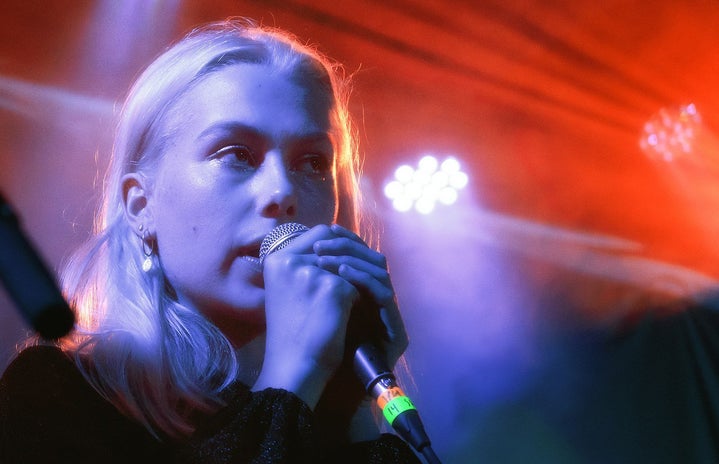In what felt like a balancing act between unwieldy chaos and earnest hestitance, Phoebe Bridgers’ Saturday Night Live performance was polarizing in the most endearing way possible. Bridgers graced the SNL stage on February 6th, performing two tracks from her quadruple Grammy-nominated album, Punisher. Though her highly supportive fanbase referred to the episode as their own version of the Super Bowl, some critics did not feel as warmly toward the indie singer’s performance, leading to some trivial controversy.
Bridgers began with “Kyoto:” an uptempo song that clashes celebratory trumpets against miserable lyrics about her paternal resentment. She and her band wore their classic matching skeleton costumes, yet her location center stage wasn’t the only thing making her stand out from the crowd. Her signature silvery blonde hair and glittery eyeshadow playfully caught the light throughout her set, making it impossible for her to blend in with the other identically-dressed performers. As for the set, a blue night sky was projected across the stage, featuring twinkling lights and the occasional shooting star.
Once she began to perform, her attitude was somewhat reserved, which contrasts against the song’s undeniably triumphant studio recording. Despite her shy start, by the end of the song she was truly beaming with confidence. In a way, her performance reminded me of the iconic “Come On Eileen” scene from The Perks of Being a Wallflower (2012), in which–after several minutes of insecurity–Charlie finally built up the courage to abandon his inhibitions at a party and dance with his friends. Just like Charlie, the latter half of Phoebe’s first act released all of the built up tension created from the performance’s initial anxiety, leaving viewers feeling proud and excited. “Kyoto” was generally well received–especially the songs’ signature woo sound effect–and was a solid SNL debut.
She concluded by singing (errr… screaming?) the last track from Punisher, “I Know The End.” It’s a melodramatic, apocalyptic, slowly burning ballad–thus, a perfect way to go out with a bang and finalize this outstanding career milestone. Awashed in a red glow and now adorned in a skeletal ribcage made entirely of pearls, Phoebe looked nothing short of decadent. She looked like the wealthy heir to an incredibly haunted house. A thick fog hugged the floor and a red light flickered ominously over the stage. She performed quite well–once again, starting out a little breathless and shy, only to build up to a confident glow.
When she began her signature scream during “I Know The End,” a jagged beam resembling lightning began to crackle along the wall behind her. The lightning projection slowly got wider and wider as her scream raged on in the microphone, until it eventually spanned the entire wall. It was a beautiful addition to the set, and seemed to reflect that her emotion was powerful enough to tear the foundation of the SNL building to the ground. Needless to say, this was excellent for the world-crumbling theme of the song.
The controversy started with the very last portion of “I Know The End.” After her scream-cry sequence, Bridgers removed her Danelectro Dano ’56 baritone guitar from her body and began smashing it against an amplifier. It took many smashes to get the guitar to even look broken and each one appeared to take Bridgers’ full body strength. This caused some individuals to feel second hand embarrassment and some to feel genuinely angry that she purposefully ruined an $85 guitar.
Considering most of the latter backlash was from men, I feel as though these comments were just misguided anger and thinly veiled misogyny, because… come on. Of all the things to be mad at… a woman smashing a guitar? Do Nirvana or Jimi Hendrix’s instrument destruction rub them the wrong way, too? Anyways, I digress. Bridgers responded to the backlash with humor, as she usually does. She jokingly posted a photo on her Instagram with the tongue-in-cheek caption: “got some really great feedback from my performance ! next time i’ll just burn it and it will be more expensive.”
Personally, I interpreted this attempted guitar smash as equally endearing as it was tragic. Clearly, she wanted so badly for the guitar to collapse in on itself, to make a spectacle of its mutilation and destruction. But no matter how bad she wanted to kill it, the guitar resisted. This feels like a common motif throughout Bridgers’ music: the relentless desire in a one-sided relationship to hold on when there’s nothing left serving you. It’s gut wrenching and twisted, but a little funny at the surface, and I’ve never seen anything more on brand from a Phoebe Bridgers performance.
Contrasting upbeat melodies with depressing lyrics, red lighting with blue lighting, timidity with confidence, and destruction with resistance, all of Phoebe Bridgers’ juxtapositions within her SNL performance made it an artform in itself.



